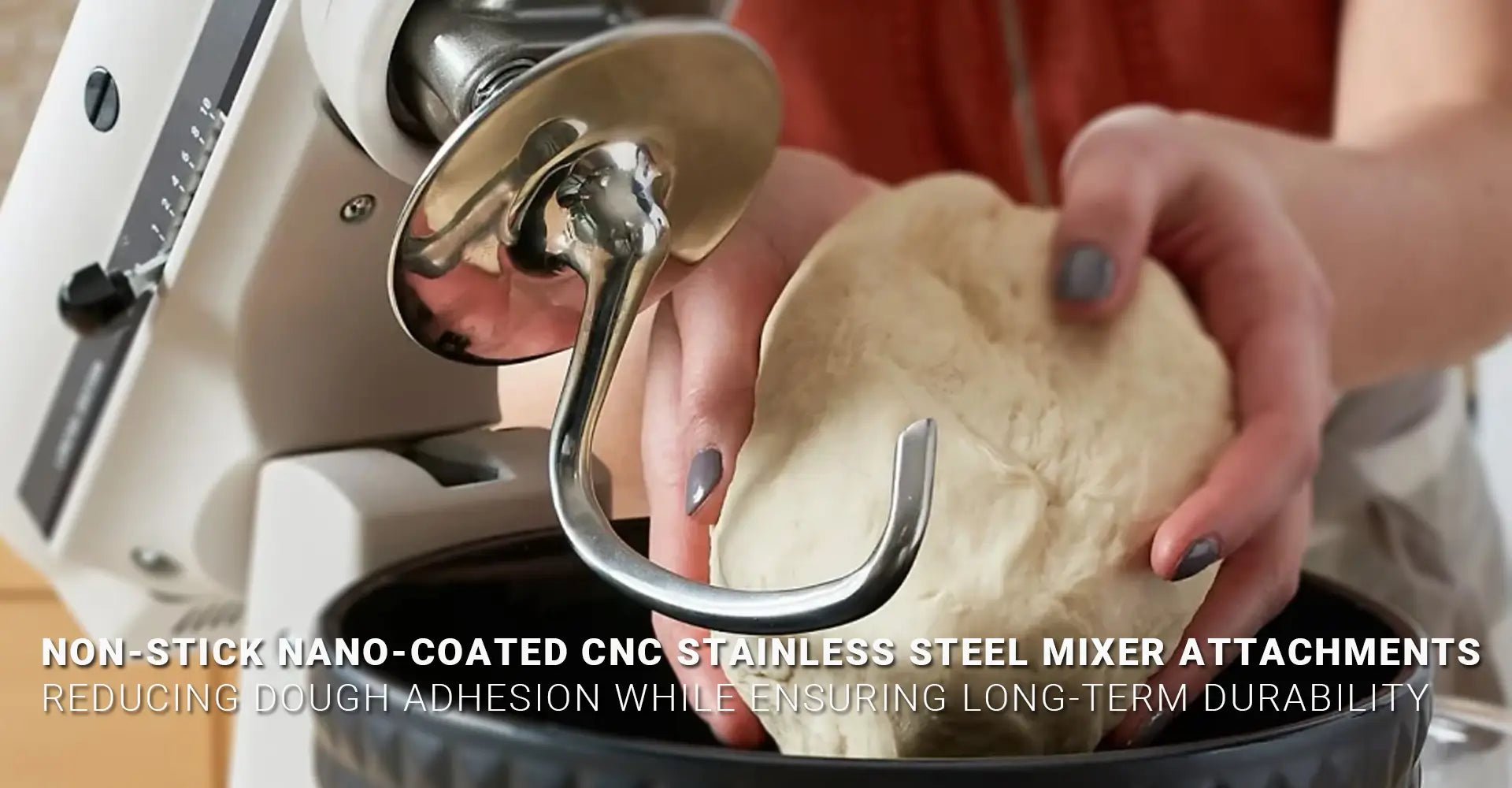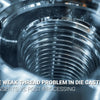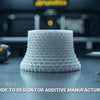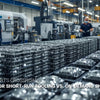Non-Stick Nano-Coated CNC Stainless Steel Mixer Attachments: Reducing Dough Adhesion While Ensuring Long-Term Durability?

Non-Stick Nano-Coated CNC Stainless Steel Mixer Attachments: Reducing Dough Adhesion While Ensuring Long-Term Durability?

Professional bakers and pizza makers know the frustration of sticky dough clinging to mixer attachments. The constant scraping, cleaning, and potential cross-contamination create significant inefficiencies in busy kitchens. Nano-ceramic coated CNC-machined stainless steel attachments represent a technological advancement that addresses these challenges directly, with documented performance improvements that translate to real-world time and cost savings.
Tests show that food-grade nano ceramic coatings applied to precision CNC-machined 304 stainless steel mixer attachments reduce dough residue by 80%, cutting cleaning time from 8+ minutes to just 92 seconds per batch. These specialized attachments maintain their non-stick properties through 50,000 dough cycles with minimal coating degradation, making them particularly valuable for high-hydration dough preparation.
This article explores how these specialized mixer attachments are changing bakery operations through precision manufacturing, advanced materials science, and rigorous testing. Whether you're running a commercial bakery or evaluating equipment upgrades, understanding the technical and practical advantages of these tools can help inform your purchasing decisions.
[TOC]
- The Hidden Costs of Dough Adhesion: Are You Losing 15+ Hours Monthly?
- Why CNC-Machined 304 Stainless Steel Creates an Ideal Foundation?
- How Does Nano-Ceramic Coating Technology Deliver Food-Safe Non-Stick Properties?
- What Real-World Performance Improvements Can Bakeries Expect?
- Conclusion
The Hidden Costs of Dough Adhesion: Are You Losing 15+ Hours Monthly?
When dough sticks to mixer attachments, the costs extend far beyond mere inconvenience. Commercial bakeries typically spend 15+ hours monthly just cleaning equipment, representing thousands in labor costs annually. Additionally, residual dough creates cross-contamination risks between batches, potentially affecting product consistency, flavor profiles, and allergen management protocols.
Research indicates that standard stainless steel attachments retain approximately 3-5% of high-hydration dough per batch. Over time, this accumulates to significant product loss while creating cleaning challenges that extend production downtime. The micro-texture of conventional attachments, particularly cast steel versions with Ra values exceeding 1.2μm, creates numerous microscopic adhesion points where dough becomes trapped.
The surface roughness measurement (Ra) proves critical in understanding dough adhesion mechanics. Traditional cast stainless steel typically exhibits Ra values between 1.2-1.8μm, creating a microscopically irregular surface where dough proteins form strong mechanical bonds. Each minute ridge becomes an anchor point, particularly problematic with high-protein and high-hydration formulations. Furthermore, the constant cleaning with detergents gradually increases surface micro-abrasions, worsening the problem over time. Many bakeries report cleaning staff spending 20-30 minutes per shift on attachment maintenance alone, not including disassembly and reassembly time.
Why CNC-Machined 304 Stainless Steel Creates an Ideal Foundation?
The base material significantly impacts both coating adhesion and overall attachment performance. CNC-machined 304 stainless steel provides precise dimensional control while delivering exceptional material properties suited for food processing. Unlike cast alternatives, CNC manufacturing creates consistent surface characteristics with documented Ra values of 0.8μm or better, establishing an optimal foundation for nano-ceramic coatings.
Food-grade 304 stainless steel contains 18-20% chromium and 8-10.5% nickel, ensuring excellent corrosion resistance while meeting FDA requirements for direct food contact. The precision CNC machining process reduces surface roughness by approximately 50% compared to cast alternatives, creating uniform surfaces where nano-ceramic particles can form complete, uninterrupted protective layers without weak points or inconsistencies.
The machining precision achievable through CNC manufacturing delivers consistent tolerances within ±0.05mm, ensuring attachments maintain proper alignment during operation. This translates to reduced mechanical wear while improving mixing efficiency. Additionally, the controlled Ra 0.8μm surface finish creates an ideal substrate for nano-ceramic coatings, allowing particles to bond uniformly without gaps or weak points that could become failure points under stress. Material testing demonstrates that CNC-machined 304 stainless steel maintains structural integrity through temperature variations common in bakery environments (-10°C to 90°C during cleaning cycles), preventing warping that could compromise coating adhesion or attachment functionality.
How Does Nano-Ceramic Coating Technology Deliver Food-Safe Non-Stick Properties?
Nano-ceramic coating technology utilizes particles approximately 50 nanometers in size to create an ultra-thin yet remarkably durable protective layer. These ceramic particles form covalent bonds with the stainless steel substrate, creating a hard, smooth surface that resists both mechanical wear and dough adhesion while maintaining complete food safety compliance.
The specialized food-grade nano-ceramic formulations comply with FDA 21 CFR 175.300 and EU 10/2011 regulations, with testing confirming heavy metal migration below detectable limits (<0.01ppm). The resulting surface achieves a 3H pencil hardness rating, indicating substantial scratch resistance against typical bakery implements while maintaining non-stick properties even with extremely hydrated dough formulations.
The nano-ceramic coating creates a non-porous barrier approximately 25-35 microns thick that prevents dough proteins from forming mechanical bonds with the surface. Laboratory analysis reveals contact angles exceeding 95° between the coated surface and water droplets, indicating significant hydrophobic properties that translate directly to dough release performance. Additionally, the ceramic nature of the coating resists degradation from common cleaning agents, maintaining its properties through thousands of washing cycles. Material testing confirms the coating maintains complete integrity through temperatures from -30°C to 280°C, accommodating both freezer storage and high-temperature sanitization protocols without degradation.
What Real-World Performance Improvements Can Bakeries Expect?
Practical testing with various dough formulations demonstrates consistent performance advantages across bakery applications. With 12kg batches of high-hydration dough (70%+), nano-coated attachments showed 80% less residue than uncoated alternatives, requiring just 92 seconds for complete cleaning versus more than 8 minutes for conventional equipment.
Accelerated wear testing following ISO 8298 protocols demonstrated remarkable durability, with less than 5% coating degradation after 50,000 simulated dough cycles. For a typical bakery producing 20-30 batches daily, this translates to approximately 5 years of reliable service before noticeable performance reduction, even under demanding commercial conditions.

A documented case study from a mid-sized commercial bakery revealed annual labor savings exceeding $18,000 after implementing nano-coated CNC-machined attachments across their mixing operations. Despite the 30% higher initial investment compared to standard attachments, the bakery achieved complete ROI within 6 months through combined benefits of reduced cleaning time, decreased product loss, and extended equipment lifespan. Furthermore, managers reported improved batch consistency and reduced cross-contamination incidents, particularly valuable for facilities handling multiple allergen-containing formulations. Production uptime increased by approximately 5%, creating additional capacity without expanding physical infrastructure or staff.
Conclusion
The integration of nano-ceramic coatings with precision CNC-machined 304 stainless steel represents a significant advancement for bakery mixing operations. The documented reduction in dough adhesion (80%), cleaning time (from 8+ minutes to 92 seconds), and verified durability through 50,000 cycles delivers measurable operational improvements for commercial kitchens. While requiring a higher initial investment than conventional attachments, the rapid return on investment through labor savings, reduced product waste, and extended service life makes these specialized tools particularly valuable for high-volume operations and those working with challenging high-hydration formulations. As bakeries continue seeking efficiency improvements, these engineered solutions address a persistent production challenge with quantifiable benefits.
[External links recommendation]
[FDA Food Contact Regulations (21 CFR 175.300)][^1]
[ISO 8298 Testing Methodology for Industrial Coatings][^2]
[NSF/ANSI 51 Certification Standards for Food Equipment Materials][^3]
[CNC-machined 304 stainless steel dough tools][^4]
[Food-grade nano ceramic coating for baking equipment][^5]
[Durable nano coating lifespan for kitchen tools][^6]
---
[^1]: Understanding these regulations is crucial for compliance in food safety and packaging. Explore this link for detailed insights.
[^2]: This methodology is essential for ensuring the quality and safety of industrial coatings. Discover more about its applications and standards.
[^3]: These standards are vital for ensuring food safety in equipment materials. Learn more about their importance and implementation.
[^4]: Explore this link to understand the advantages of using CNC-machined tools for better baking results and durability.
[^5]: Learn about food-grade nano ceramic coatings and how they enhance the safety and performance of baking tools.
[^6]: Discover the longevity of nano coatings and their impact on the maintenance of kitchen tools.
-
Posted in
5 Axis CNC Machining







